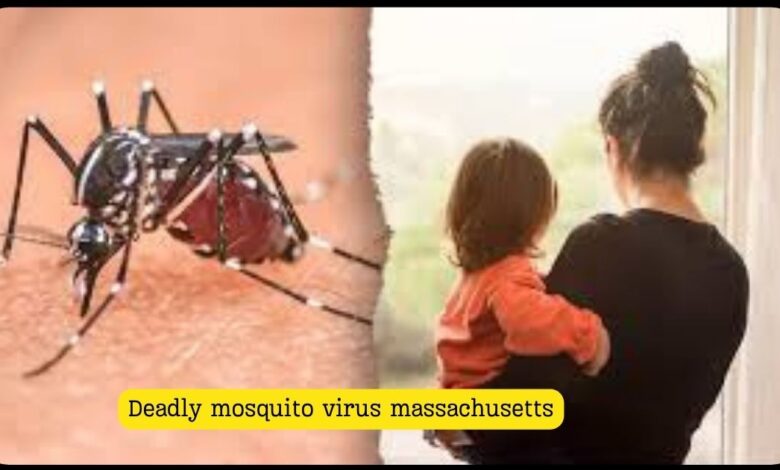Deadly Mosquito Virus Massachusetts: What You Need to Know

Deadly Mosquito Virus Massachusetts: What You Need to Know
Several towns in Massachusetts are fighting a deadly mosquito-borne virus after a man in his 80s got sick. He caught eastern equine encephalitis (EEE), a rare and dangerous disease. The CDC says it kills about 30% of those who get it.
The towns of Douglas, Oxford, Sutton, and Webster are at high risk. People living there are told to stay indoors when mosquitoes are most active. Plymouth, about 40 miles southeast of Boston, is closing outdoor places from dusk till dawn. This is because a horse there got the disease.
Health experts across Massachusetts recommend using mosquito repellent and getting rid of standing water near homes. This helps prevent the spread of the virus.
Key Takeaways
- The deadly mosquito virus known as eastern equine encephalitis (EEE) kills about 30% of those infected.
- Massachusetts has experienced EEE outbreaks in recent years, with several deaths among confirmed cases.
- Certain towns in Massachusetts have been designated as high-risk areas for the virus, prompting officials to urge residents to take precautions.
- There are no vaccines or specific treatments available for EEE, making prevention and mosquito control crucial.
- Symptoms of EEE can develop within 4-10 days and include severe headaches, chills, vomiting, and high fever.
Understanding the Threat of Eastern Equine Encephalitis (EEE)
Eastern Equine Encephalitis (EEE) is a rare but severe mosquito-borne disease. It is caused by an arbovirus. This virus is common in birds and can spread to humans and other mammals through mosquito bites. The CDC says EEE has a mortality rate of about 30%. Many survivors face permanent neurological problems, and few fully recover.
A Rare but Severe Mosquito-Borne Disease
Even though only a few EEE cases are reported in the U.S. each year, they mostly happen in the eastern and Gulf Coast states from late spring to fall. The disease can cause severe symptoms like fever, headache, vomiting, diarrhea, and seizures. Sadly, there are no treatments or vaccines for EEE, making public health efforts crucial.
“EEE is very serious, and there are no vaccines or treatments currently available for the disease.”
The 2019 EEE outbreak in Massachusetts led to six deaths among 12 confirmed cases. The next year, five more cases and an additional death were reported. With 88 communities in Massachusetts at high risk for the virus, the threat of EEE is real. This highlights the need for vigilance and awareness among the public.
Deadly Mosquito Virus Massachusetts: Critical Risk Areas and Preventive Measures
The threat of the deadly Eastern Equine Encephalitis (EEE) virus is real in Massachusetts. Health officials have pinpointed several areas at high risk. These include Douglas, Oxford, Sutton, and Webster, where people need to act fast to stay safe.
In these areas, people are told to end outdoor activities by 6 p.m. until September 30th. After that, the curfew shifts to 5 p.m. until the first frost. Plymouth, about 40 miles southeast of Boston, has closed its outdoor facilities from dusk till dawn as a safety step.
Across the state, folks are advised to use mosquito repellent and drain standing water near their homes. These steps can help stop the EEE virus from spreading. This virus has a mortality rate of about 30%.
Health authorities are fighting back with strong measures. They’re using insecticides like Anvil 10+10 in high-risk areas. This targets mosquitoes carrying the EEE virus. Their goal is to protect everyone and lower the risk of more infections.
As the situation changes, it’s key for Massachusetts residents to listen to health officials. By taking steps together, we can lessen the impact of this dangerous disease.
| Preventive Measures Against EEE | Mosquito Control Efforts |
|---|---|
|
|
Stopping the deadly mosquito virus in Massachusetts needs teamwork between health officials and the community. By knowing the high-risk areas and taking steps to prevent it, we can protect our families and neighborhoods.
Community Response and Public Health Advisories
The EEE outbreak in Massachusetts is a big concern for local communities. Authorities are working hard to keep people safe. They urge everyone to take this disease seriously, as it can have serious effects on the body and mind.
Health advisories are out, telling people to stay indoors when mosquitoes are most active, from dusk to dawn. They also suggest using insect repellent when outside. Some towns, like Plymouth, have closed outdoor areas during these times to protect everyone.
Protecting Residents from the Virus
State and local teams are fighting back by spraying insecticides from the air. This helps kill mosquitoes and stops the virus from spreading. It’s important because EEE can be deadly, with a fatality rate of up to 30%.
- The Massachusetts Department of Public Health (DPH) has confirmed the first human case of EEE in Worcester County since 2020.
- Only one human case of EEE has been reported in Massachusetts this year, but mosquitoes throughout the state have tested positive for the virus.
- Typical symptoms of EEE include fever, vomiting, diarrhea, headache, stiff neck, seizures, behavioral changes, and drowsiness.(LINK).
Despite the challenges, authorities are doing everything they can to protect their communities. By listening to health advisories and taking steps to prevent it, people can lower their risk of getting this serious disease.
“The period from dusk through dawn is considered ‘peak mosquito hours,’ and public health officials have urged people in specific towns to finish outdoor activities by 6 p.m. until Sept. 30, and by 5 p.m. after that until the first hard frost.”
Conclusion
The Eastern Equine Encephalitis (EEE) virus is a big threat in Massachusetts. Many areas are at high risk. This virus can cause severe brain problems and has a 30% death rate.
To fight this, local leaders have set curfews and restricted outdoor activities. It’s important for people to listen to health alerts, wear protective gear, and remove standing water near homes. By doing these things, we can lessen the virus’s effects and keep everyone safe.
Even though EEE is rare in the U.S., happening mostly in the east and Gulf Coast, the cases in Massachusetts show we must stay alert. By following health advice, we can protect ourselves and our families from this dangerous virus.
FAQ
What is the deadly mosquito-borne virus affecting Massachusetts?
In Massachusetts, a dangerous virus from mosquitoes is spreading. It’s called Eastern Equine Encephalitis (EEE). This virus is rare but very serious. It can spread to people through mosquito bites.
What are the symptoms of EEE?
People with EEE may feel fever, headache, and throw up. They might also have diarrhea and seizures. This disease can cause serious brain problems and is very deadly, with a 30% fatality rate.
Which areas in Massachusetts are considered “critical risk” for EEE?
Douglas, Oxford, Sutton, and Webster in Massachusetts are at high risk for EEE. These towns are considered “critical risk” areas.
What preventive measures are being taken in Massachusetts?
In Massachusetts, people are told to stay indoors when mosquitoes are most active. They should also use mosquito repellent and remove standing water near their homes. Public outdoor places are closed from dusk to dawn. Spraying insecticides is also being done to control mosquitoes.
How can residents protect themselves from the EEE virus?
To stay safe, follow health advice, use insect repellent, and avoid being outside when mosquitoes are most active. Also, remove standing water near your home to stop mosquitoes from breeding.
Read More :-
Justin and Hailey Bieber announce birth of first child



